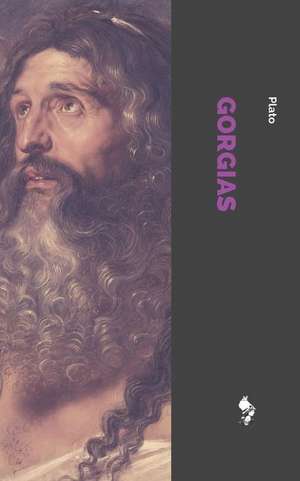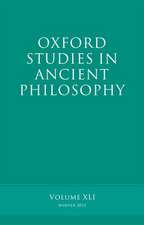Gorgias
Autor Plato Traducere de Benjamin Jowetten Limba Engleză Paperback – 28 sep 2018
Preț: 41.21 lei
Nou
Puncte Express: 62
Preț estimativ în valută:
7.89€ • 8.11$ • 6.54£
7.89€ • 8.11$ • 6.54£
Carte indisponibilă temporar
Doresc să fiu notificat când acest titlu va fi disponibil:
Se trimite...
Preluare comenzi: 021 569.72.76
Specificații
ISBN-13: 9781724160928
ISBN-10: 1724160923
Pagini: 124
Dimensiuni: 127 x 203 x 7 mm
Greutate: 0.14 kg
Editura: LIGHTNING SOURCE INC
ISBN-10: 1724160923
Pagini: 124
Dimensiuni: 127 x 203 x 7 mm
Greutate: 0.14 kg
Editura: LIGHTNING SOURCE INC
Descriere
Descriere de la o altă ediție sau format:
The struggle which Plato has Socrates recommend to his interlocutors in Gorgias - and to his readers - is the struggle to overcome the temptations of worldly success and to concentrate on genuine morality. Ostensibly an enquiry into the value of rhetoric, the dialogue soon becomes an investigation into the value of these two contrasting ways of life. In a series of dazzling and bold arguments, Plato attempts to establish that only morality can bring a person true happiness, and to demolish alternative viewpoints. It is not suprising that Gorgias is one of Plato's most widely read dialogues. Philosophers read it for its coverage of central moral issues; others enjoy its vividness, clarity and occasional bitter humour. This new translation is accompanied by explanatory notes and an informative introduction. ABOUT THE SERIES: For over 100 years Oxford World's Classics has made available the widest range of literature from around the globe. Each affordable volume reflects Oxford's commitment to scholarship, providing the most accurate text plus a wealth of other valuable features, including expert introductions by leading authorities, helpful notes to clarify the text, up-to-date bibliographies for further study, and much more.
The struggle which Plato has Socrates recommend to his interlocutors in Gorgias - and to his readers - is the struggle to overcome the temptations of worldly success and to concentrate on genuine morality. Ostensibly an enquiry into the value of rhetoric, the dialogue soon becomes an investigation into the value of these two contrasting ways of life. In a series of dazzling and bold arguments, Plato attempts to establish that only morality can bring a person true happiness, and to demolish alternative viewpoints. It is not suprising that Gorgias is one of Plato's most widely read dialogues. Philosophers read it for its coverage of central moral issues; others enjoy its vividness, clarity and occasional bitter humour. This new translation is accompanied by explanatory notes and an informative introduction. ABOUT THE SERIES: For over 100 years Oxford World's Classics has made available the widest range of literature from around the globe. Each affordable volume reflects Oxford's commitment to scholarship, providing the most accurate text plus a wealth of other valuable features, including expert introductions by leading authorities, helpful notes to clarify the text, up-to-date bibliographies for further study, and much more.
Notă biografică
Plato was an ancient Greek philosopher born in Athens during the Classical period in Ancient Greece. In Athens, Plato founded the Academy, a philosophical school where he taught the philosophical doctrines that would later become known as Platonism. Plato (or Platon) was a pen name derived, apparently, from the nickname given to him by his wrestling coach - allegedly a reference to his physical broadness. According to Alexander of Miletus quoted by Diogenes of Sinope his actual name was Aristocles, son of Ariston, of the deme Collytus (Collytus being a district of Athens).Plato was an innovator of the written dialogue and dialectic forms in philosophy. He raised problems for what later became all the major areas of both theoretical philosophy and practical philosophy. His most famous contribution is the Theory of forms, which has been interpreted as advancing a solution to what is now known as the problem of universals. He is also the namesake of Platonic love and the Platonic solids.His own most decisive philosophical influences are usually thought to have been, along with Socrates, the pre-Socratics Pythagoras, Heraclitus, and Parmenides, although few of his predecessors' works remain extant and much of what we know about these figures today derives from Plato himself.[a]Along with his teacher, Socrates, and his student, Aristotle, Plato is a central figure in the history of philosophy.[b] Unlike the work of nearly all of his contemporaries, Plato's entire body of work is believed to have survived intact for over 2,400 years.[6] Although their popularity has fluctuated, Plato's works have consistently been read and studied. Through Neoplatonism Plato also greatly influenced both Christian and Islamic philosophy (through e.g. Al-Farabi). In modern times, Alfred North Whitehead famously said: "the safest general characterization of the European philosophical tradition is that it consists of a series of footnotes to Plato.
Cuprins
GorgiasAcknowledgments
Reference System Used in this Edition
Chronolgy
Introduction
Further Reading
A Note on the Text
Reference System Used in this Edition
Chronolgy
Introduction
Further Reading
A Note on the Text
Gorgias
A: Dialogue with Gorgias
B: Dialogue with Polus
C: Dialogue with Callicles
Notes
Glossary of Greek Terms
Index
Recenzii
`Professor Dodds's fine edition (which both fairly overhauls the manuscript tradition and supplies a commentary as wide-ranging as it is perspicacious) fills a gap untouched in this country since 1890 ... The Gorgias should have a special appeal to contemporary students, and to historians no less than philosophers.'Times Literary Supplement`The admired qualities of [Dodd's works], a scholarship both exact and deep, an economy and lucidity in exposition (Dodds has few rivals in saying much in the fewest words with absolute clarity), and an immense level-headedness and sobriety which - combined with the sharpest acumen and independence of judgement in the handling of evidence - is never seduced by the charm of fantasy, all these once more characterize his edition of the Gorgias.'Philosophical Quarterly












